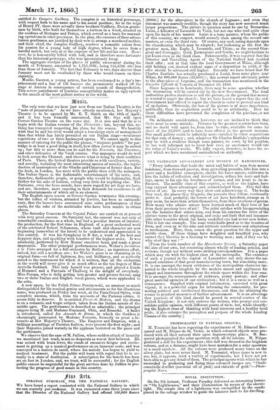Eusit.
The only note that we hear just now from our Italian Theatres is the "note of preparation." As we have already mentioned, her Majesty's Theatre is to be opened by Mr. E. T. Smith on the 10th of April; and it has been formally announced, that Mr. Gye will open Covent Garden Theatre on the same day. It is also said that he is to begin with the Italian version of the Frciselnitz ; but, beyond this, no- thing has transpired respecting his plans for the season. We heartily wish that he and his rival would adopt a less sleepy style of management than that which has lately prevailed on our Italian stage—wearisome repetitions of two or three hackneyed operas. We cannot apply to this manner of catering for the public the phrase, " toujours perdrix " for par- tridge is at least a good thing in itself, how often soever it may be served up ; but this is more than can be said for the 23-aviata, the Trovatore, and other delicacies of the Verdi cuisine. Our managers would do well to look across the Channel, and observe what is doing by their confreres of Paris. There, the lyrical theatres provide us with excellence, variety, and novelty, including the most interesting species of novelty, the repro- duction of masterpieces of the Clucks and Cimarosas of former days. But the fault, in London, lies more with the public than with the managers. The Italian Opera is the fashionable entertainment 'of the town, and, therefore, fashionable people, or people who would be fashionable, flock thither for the sake of fashion, caring very little for anything else. The Parisians, even the beau monde, have more regard for art than we have, and are, therefore, more exacting in their demands for excellence in all their entertainments of which art is an element.
The English opera season at Covent Garden terminates this evening ; but the influx of visitors, attracted by Lurline, has been so extraordi- nary, that the lessees have announced nine extra performances of that opera, for the sake of the multitudes who have been unable to obtain places.
The Saturday Concerts at the Crystal Palace are carried on at present with very great success. On Saturday last, the concert was not only of remarkable excellence as a whole, but had a peculiar feature of interest ; the production, for the first time in England, of a great orchestral work of the celebrated Robert Schumann, whose rank and character are now beginning (somewhat of the latest) to be understood and appreciated in this country. It was his Symphony in B flat, a work of his best and happiest days, and sparkling with beauties of the highest order. It was admirably, performed by Herr Manns' excellent band, and made a great impression. The other principal performances were, Weber's Invitation d la Praise arranged for a full orchestra by Berlioz ; an ingenious effort, indeed, but still a needless one ; for Weber's piece is so charming in its original form—so full of lightness, fire, and brilliancy, and so perfectly suited to the instrument for which it is written, that all the orchestras in the world will never give it so much effect as the ten fingers of Miss Arabella Goddard. This lady herself was present, and played a Rondo of Hummel and a Fantasia of Thalberg to the delight of everybody. Miss Parepa, who is daily getting into greater and greater favour, sang two or three Italian and English vocal pieces, which were applauded to the echo.
A new opera, by the Polish Prince Poniatowski, an amateur as much distinguished for his musical genius and attainments as for his illustrious name, was produced on Friday last week, at the Paris Grand Opera, with complete success, which, from the accounts of the Parisian critics, it seems fully to deserve. It is entitled Pierre de ilfedieis, and the drama is on a romantic and tragic subject, taken from the Italian annals of the middle ages. The performance is described as admirable ; the principal singers being M. and Madame Guymard, Obin, and Belmar& A ballet is introduced, called Lea Amours de Diane, in which the Goddess is charmingly personated by Madame Ferraris, formerly so great a fa- vourite at Her Majesty's Theatre. The Emperor and Empress, with a brilliant assemblage of Parisian fashion, were present the first night ; and their Majesties joined warmly. in the applause bestowed on the piece and the performers.
We observe that the case of M. Jullien, whose sudden attack of insanity we mentioned last week, is not so desperate as was at first believed. He was seized with brain fever, the result of excessive fatigue and excite- ment in getting up a musical performance on an immense scale, and was conveyed to a maison de sante, where his malady has begun to yield to medical treatment. But the public will learn with regret that he is ac- tually in a state of destitution. A subscription for his benefit has been set on foot in London, and, we trust, will be successful ; for the English public cannot be ungrateful for the great services done by Jullien in pro- moting the progress of good music in this country.


























 Previous page
Previous page